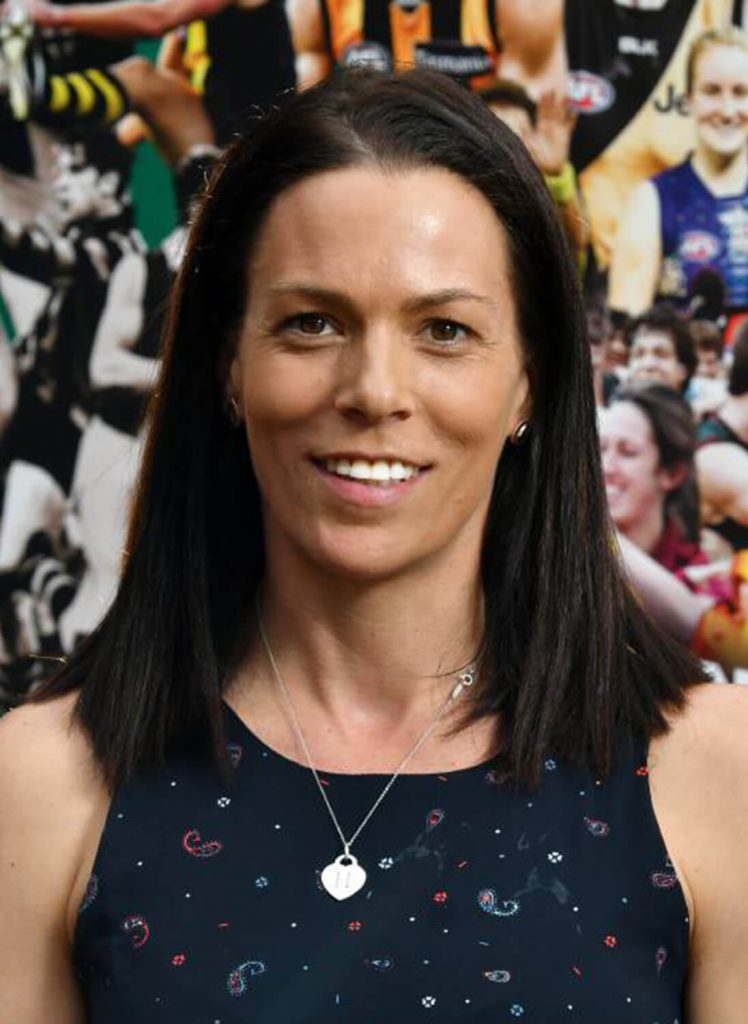
The previous CEO of AFL Tasmania, Trish Squires, shares her ideas on resilience and leadership. This includes being OK with not being perfect.
Hi Trish, you’ve done all sorts of incredible things in your life. What was it like being the Chief Executive Officer of AFL Tasmania?
It was fantastic. AFL Tasmania oversees all levels of the game in the state. So from AusKick, which is a kids’ footy program for years 5 through to 12, right up to their talent pathways. My role was to support community football. And also to run the Tasmanian State League, and our Devil’s Program for boys and girls.
What did you like about your job the most?
Meeting the volunteers is pretty special. Football clubs need volunteers. Without the grass roots footballing community we wouldn’t have kids playing footy. It’s that simple. I also love it when I see young kids playing football at the junior level. That’s so important. It’s great for the community, and it brings people together.
You were working in a traditional ‘blokey’ industry. Is the culture changing?
I was the first female State CEO of the AFL. It’s a huge honour, and another small step forward for women in the AFL community. The culture is changing. The success of the Australian Football League for Women (AFLW) has had a huge impact. The fact we now have an elite game for women and we saw close to 50,000 people in attendance for a grand final. It shows how people are supporting the AFLW. In 2018, when I started in the role in Tassie, there were only seven girls and women’s teams across the state – now we have 113.
What was your next challenge after being the CEO of AFL Tasmania?
I had a fabulous opportunity to head up AFL Queensland. It’s a ‘non-traditional’ AFL footy market to grow participation. So it’ll be a new set of challenges I’m sure.
Looking back to your school years, what subjects did you like?
I loved sport. In particular, the health and education aspect of it. I also liked English and Psychology.
You did an AFL traineeship. Can you tell us about that?
Well, my older brother did an AFL traineeship, and he enjoyed it. So when I finished Year 12 I thought, well, here’s an opportunity to do something different. It was a TAFE course, as well as providing on-the-job training at the Melbourne Footy Club. So it combined the practical with study, which I loved. That was about 20 years ago.
What would you say to a teenager who doesn’t know what they want to do after they leave school?
I don’t think it matters if you don’t know what you want to do when you leave school. I’m about to start a new role that I couldn’t have anticipated six months ago. I have aspirations for moving forward and am doing lots of other things in my life. But I also know things can change. I don’t think it’s realistic to know what you’re going to do for the rest of your life, so try not to stress about it.
Do you enjoy learning?
I do. I just finished my Executive Certificate at Harvard Kennedy School. I did that over the last 18 months. I did two subjects in person over in America. I also did one online that was around public leadership. That stretched me but I think it’s important to always be developing and learning. Also, we need to be open to feedback to ensure we grow as leaders.
You do a lot of charity work. Are you still involved in the Reach Foundation?
Yes, as an Ambassador – that’s what attracted me to football. Before working for the AFL, I’d been the CEO of Not For Profits. The AFL is also a Not For Profit. So you’re working with people who are passionate about footy, and it’s about assisting the community. Football clubs are more than football clubs to a lot of people. They’re places people go to feel safe. To ‘connect’, which is important. As a leader, I always want to contribute to the place I live, and to make other people’s lives better. It’s important as a citizen to do that.
Tell us about your work as a keynote speaker. What are the themes you like to talk about?
I talk about surviving the tsunami in 2004 in Thailand, and how I lucky I was to survive. It was an experience that taught me a lot of life lessons, and has helped me with some pretty difficult jobs. I talk about how I’ve learnt to become more resilient, and also that it’s OK sometimes to not be doing things perfectly. That’s something people need to hear. So for me, it’s about being honest and genuine and sharing my story with others.
How do you learn resilience? It’s about life experiences and bouncing back. It’s that analogy of a rubber band – some things will pull us and stretch us one way and then another. But the rubber band bounces back. It might be a different shape but it’s the same rubber band. That’s how we are as people. So some things are going to impact us and we’ll be different as a result, but we’re essentially the same person.
If you could give one piece of advice for success outside of school, what would it be?
Get involved in whatever it is you’re passionate about. I’ve had quite a good career so far because I do things I’m passionate about. If you enjoy something then find a way to do it in your life more often. This brings happiness, and that’s what life is all about.
